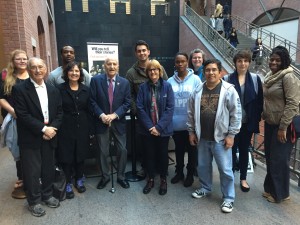 Old Dominion University’s Institute for Jewish Studies and Interfaith Understanding offered students the opportunity to visit the U.S. Holocaust Memorial Museum in Washington, D.C. Twelve ODU students, along with Farideh Goldin, IJIU director, and professor of history, Annette Finley-Croswhite, made the trip on Friday, Nov. 20.
Old Dominion University’s Institute for Jewish Studies and Interfaith Understanding offered students the opportunity to visit the U.S. Holocaust Memorial Museum in Washington, D.C. Twelve ODU students, along with Farideh Goldin, IJIU director, and professor of history, Annette Finley-Croswhite, made the trip on Friday, Nov. 20.
The visit began with the core exhibit that starts on an upper floor of the museum and included plenty of time to visit newer exhibits, as well as meet two Holocaust survivors, Martin Weiss and Harry Greenbaum. Other trip highlights included introducing students to Dr. Robert J. Williams, director of development and New Initiatives at the Mandel Center for Advanced Holocaust Studies. Williams invited the group for a tour of the Center and Library and explained internship and research opportunities to the students.
One of the new exhibitions, “Some were Neighbors” seeks to explain the question of “why” with regard to the Holocaust by demonstrating as the exhibit’s subtitle makes clear, “Collaboration and Complicity in the Holocaust” went far beyond Hitler and the SS and included everyday “bystanders” who chose whether to act or not in the face of atrocity. The exhibit opens with a quote from the doyen of Holocaust Studies in the United States, Raul Hilberg. “At crucial junctures,” Hilberg wrote, “every individual makes decisions…every decision is individual.” Hopefully people emerge from the exhibit with a greater sense of personal responsibility and a sense of horror over those in the past who chose to do nothing.
While in the Museum, Elena Baum, director of UJFT’s Holocaust Commission, phoned to say that a reporter from Channel 13 News was looking for information on the Syrian refugee crisis and comparisons with the Jewish refugee crisis before and during the Holocaust. Baum connected me to Kristina Zverjako who interviewed me over the telephone while I was in the museum. That evening IJIU and our ODU students were on the news. }
A trip to the United States Holocaust Memorial Museum always raises more questions than it answers. In thinking about the meaning of the “Neighbors” exhibit and the reality of current genocides and refugee crises, I could not leave the Museum without encouraging the students to contemplate the critical question raised by Elie Wiesel and written on museum displays: “When we say ‘never again,’ what does it mean?”
by Annette Finley-Croswhite, Ph.D., professor of history, Old Dominion University

